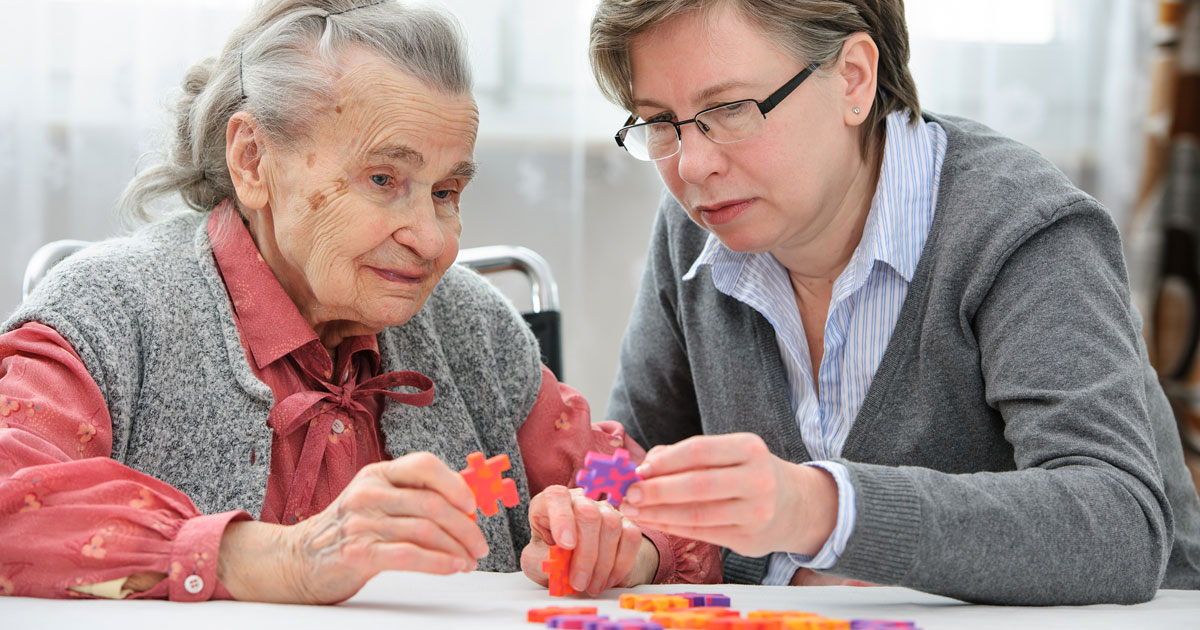
Dementia patients can experience some very challenging circumstances — and so can their family members and loved ones. As dementia progresses, the patient may begin to function in ways that are unfamiliar to themselves, and as a result, their behaviors can change dramatically.
This can be very difficult for family caretakers to manage because those changes in behavior often occur without warning, and it takes time to begin to notice what might be triggering them. Although families can struggle — even when they feel like they understand the dementia diagnosis of their loved one — managing the troubling behavior can become easier over time.
What You Need to Know About Dementia
Contrary to popular belief, dementia is not a specific medical condition, but rather, it is a useful umbrella term that covers a wide range of specific diseases. What they all have in common is that they are related to cognitive decline. Depending on the patient's condition, different parts of the brain begin to lose normal functioning. This is often the result of brain cells dying off or protein bodies obstructing neural pathways.
Symptoms of dementia can include:
- Confusion and disorientation
- Decline in coordination with motor functions
- Depression, anxiety, paranoia, and agitation
- Difficulty managing complex tasks, critical thinking skills, planning, and organization
- Difficulty with verbal expression
- Hallucinations
- Inappropriate behavior
- Memory loss
- Personality changes
- Struggles with visual or spatial abilities
- Trouble with problem-solving or reasoning
Alzheimer's Disease
The most common type of dementia is Alzheimer's disease. This condition is caused by the formation of disruptive protein structures that get in the way of connected brain cells, leading to their death. The symptoms of Alzheimer's disease can include:
- Apathy and depression
- Changes to one's personality like disinterest, suspicion, or aggression
- Confusion
- Difficulty concentrating
- Difficulty with speaking, swallowing, or walking
- Impaired judgment or decision-making abilities
- Mood changes
- Trouble remembering details about people, places, or events
Many of these symptoms overlap with other forms of dementia, but they deserve special recognition because Alzheimer's accounts for around 70% of all dementia cases.
Dementia symptoms are particularly difficult for patients and family members to deal with because they are not like most other ailments. Because of the cognitive and psychological nature of dementia, patients are prone to experiencing changes in how they think and act. That can be an incredibly disorienting experience that leads to troublesome or even aggressive behavior.

What Is Considered a Dementia Behavior?
As you begin to encounter dementia behaviors, it is important to always keep in mind that the behavior is not the conscious choice of your loved one, but rather an unfortunate side effect of their disease. Managing dementia behaviors can be very difficult for family members because their loved one is oftentimes not acting like the person they have always known, and that can provoke unsettling feelings.
Understanding that is considered a dementia behavior — and then developing strategies for effectively managing them — can be a huge help. Here are just a few common dementia behaviors to note:
- Aggression
- Paranoia
- Repetitiveness
- Sleeplessness
- Sundowning
- Wandering
Aggression
Aggressive behavior can emerge in dementia patients as a result of a variety of factors, including confusion, physical or emotional pain, fear, reactions to medication, or feeling uncomfortable with a specific task or situation.
Aggression usually comes into play in the later stages of dementia, and it can be both physical and verbal. Oftentimes, it is an unconscious expression of some kind of unmet need. If the patient is not fully conscious of what they need or feel — or if their cognitive condition prevents them from expressing that need — they might lash out in ways that feel hurtful to their caregiver.
Again — it is not the person talking here, but their disease. While it is naturally difficult, caregivers should do their best to not take aggression personally. To diffuse the situation, you can try the 4 Rs: Reassure them that you're there for them, Reorient them to help them catch their bearings, Redirect them towards familiar subjects or objects, and Reminisce about a positive memory.
Delusions and Paranoia
Like aggressive behavior, delusions can be seriously challenging for caregivers. Struggles with memory and cognition can lead patients to a firm belief in things that are not true. For example, an inability to remember where they left their keys might lead to paranoid accusations that someone has stolen them.
This should not be mistaken for hallucinations. Although hallucinations are a symptom of dementia, it is distinctly different. Delusions deal with false beliefs, whereas hallucinations are false sensory perceptions of objects or events that are not really there.
It is important to know that a person with delusions is just trying to understand their world. Be patient, keep explanations short and simple, redirect them to other activities if you can, and keep duplicates of items that can be easily lost on hand just in case.
Repetitiveness
As dementia progresses, patients are prone to repeating actions, statements, and questions. They do not always remember that they have already completed a given task or covered a certain topic. When they are exhibiting repetitive behaviors, it is often because they are trying to express something — whether it be a specific concern, feelings of confusion or anxiety, or a need for help.
To help manage this behavior, it can be helpful to identify potential triggers that cause the need for repetition. You can also try to channel the behavior into a productive activity to keep their minds moving in a specific direction. Also consider memory aids, which can help support them against some of their symptoms. Above all, be patient, work with them, and focus on their emotional state.

Sleeplessness
People with dementia often develop issues with getting good sleep. This can take the form of anything from difficulty falling asleep, sleeping fitfully through the night — or even waking in the night and thinking it is daytime, so they get up and begin to start their day. Not only can this result in a confusing experience for older adults with dementia, but the consistent lack of adequate sleep also builds up, making them exhausted during their waking hours, which can further exacerbate their condition.
Difficulty with sleeping can be caused by a range of things, including over-the-counter medications, a diet that is high in sugar or caffeine, too much time on phone or computer screens, or changes to their brains that are directly related to dementia.
To help manage these issues, it is a good idea to try to avoid things that disrupt their ideal sleep cycle. Monitoring their diet and screen time, reconsidering nighttime medications that might affect their sleep, and establishing a routine can go a long way toward helping a dementia patient sleep through the night.
"Sundowning" is a specific iteration of a patient's difficulty with sleep. After a certain point in the evening, their demeanor or behavior changes — they may become restless, agitated, or show other difficult behaviors. Knowing around what time sundowning typically occurs and having a good sense of your loved one's energy threshold might be a good way to be prepared for the behaviors when they emerge.
Wandering
Wandering is a common dementia behavior. In fact, at least 60% of patients exhibit the behavior. Because dementia affects memory and cognition, it causes people to lose their bearings. So if they are looking for someone or something, they might forget their purpose during the search and just continue to wander around. Sometimes, they might not recognize that the home they are in is their own, so they try to leave without a clear sense of where they need to go.
If your loved one is wandering, one of the best things you can do is to secure their house so that they do not get lost or injure themselves. Doors leading outside are of particular concern. Tracking devices can also be helpful in the event that they do become lost outside of the home, and it is also a good idea to enlist a team — whether that be a neighbor or another caregiver.
Conclusion
Changes in behavior that are caused by dementia can be very unsettling for both patients and their families. Even if family caregivers are well versed in the facts and protocols necessary to help manage dementia, it can still take a huge emotional toll. Aggressive behaviors can leave them feeling hurt and unappreciated, and other behaviors can quickly test a person's patience or leave them questioning whether they have things under control after all. Sometimes, it is best to seek out support.
At Keystone Health, we understand that people with dementia have unique needs, and we know how to effectively manage their behaviors. Our team has been providing home health care services to the greater Boise area for years, and we have become a trusted provider here in Idaho. If you or someone you love are in need of medical service or support as a result of a dementia diagnosis, we can help. Get started today with our New Patient Process, and you will soon be able to have the support that is right for your family.
